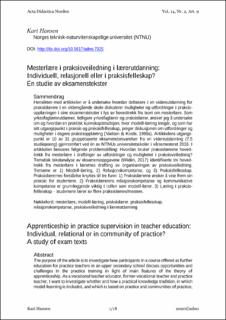Mesterlære i praksisveiledning i lærerutdanning; Individuell, relasjonell eller i praksisfellesskap? En studie av eksamenstekster.
Peer reviewed, Journal article
Published version

Åpne
Permanent lenke
https://hdl.handle.net/11250/2994927Utgivelsesdato
2020Metadata
Vis full innførselSamlinger
- Institutt for lærerutdanning [3411]
- Publikasjoner fra CRIStin - NTNU [37304]
Sammendrag
The purpose of the article is to investigate how participants in a course offered as further education for practice teachers in an upper secondary school discuss opportunities and challenges in the practice training in light of main features of the theory of apprenticeship. As a vocational teacher educator, former vocational teacher and practice teacher, I want to investigate whether and how a practical knowledge tradition, in which model-learning is included, and which is based on practice and communities of practice, characterizes the discussion of challenges in today's practice training (Nielsen & Kvale, 1999a). The article is based on 10 out of 31 group-based exam papers from a further education course (7.5 credits) completed at one of NTNU's university schools during the spring semester 2016. The article answers the following research question: How do the practice teachers use main features of apprenticeship in discussions of challenges and opportunities in practice supervision? The thematic text analysis of the exam papers (Widén, 2016) identified three main features from apprenticeship in the teachers' discussion of the organization of practice supervision. The themes are 1) Model-learning, 2) Relational competence, and 3) Community of practice. The practice teachers' reflection is linked to three findings: 1) The practice teachers want to showcase their practice to the students. 2) Relational competence and the practice teacher's communicative competence are fundamentally important in the role as a model teacher. 3) Practice in working communities – students learn from several practice teachers/ masters.
